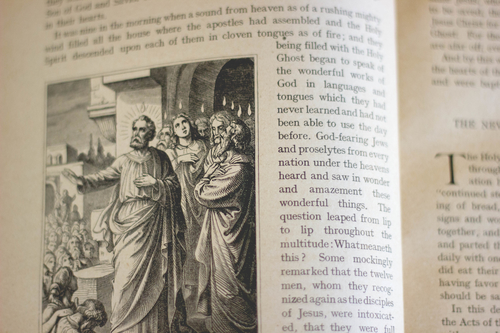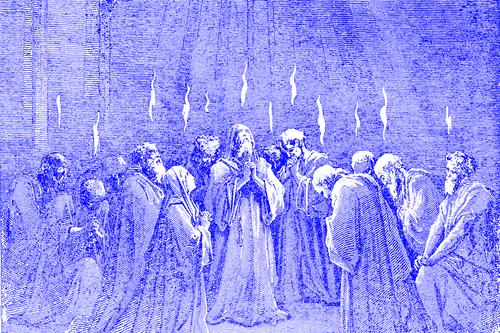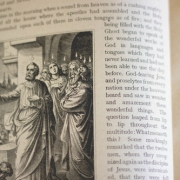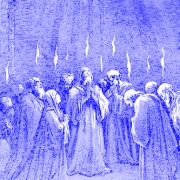“When I See the Blood” – Exodus 12:13 – October 07 2020
/0 Comments/in Enduring Words for Troubled Times/by David Guzik“The Feeding of the 100” – 2 Kings 4:42-44 – October 06 2020
/0 Comments/in Enduring Words for Troubled Times/by David Guzik“Fulfilling the Law – For Us and In Us” – Matthew 5:17-18 – October 05 2020
/0 Comments/in Enduring Words for Troubled Times/by David GuzikA Changed Man
/1 Comment/in Weekly Devotional/by David GuzikBut Peter, standing up with the eleven, raised his voice and said to them, “Men of Judea and all who dwell in Jerusalem, let this be known to you, and heed my words.” (Acts 2:14)
Acts 2 describes a series of remarkable events. As the 120 disciples of Jesus gathered in an upper room, first there was an unusual sound. Then there were one-of-a-kind little flames of fire that strangely appeared above the heads of everyone in the upper room. Then, they spontaneously began to praise God and declare His marvelous works in languages they had never spoken before. This is called the gift of tongues, and it is spoken about in several other Bible passages.

On a day of strange things, the best thing was yet to happen. We come to that starting at verse 14: Peter, standing up with the eleven. What a sight! Peter standing together with the other apostles, ready to speak to the amazed multitude.
When Peter raised his voice, it was the start of an amazing sermon. Standing with the eleven, Peter stood and preached to the crowd as a representative of the whole group of apostles.
We should notice that the speaking in tongues stopped when Peter began to preach. The Holy Spirit now worked through Peter’s preaching and would not work against Himself through the speaking of tongues at the same time.
When Peter raised his voice, it was also evidence of a remarkable change in Peter. Now he displayed a courage and boldness that was a complete contrast to the way that he denied even knowing Jesus when his Savior was arrested. All that was before being filled with the Holy Spirit. Now, Peter was a different man.
On the Day of Pentecost Peter didn’t teach as the rabbis in his day usually did, who gathered disciples around them, sat down, and instructed them and any others who might listen. Instead, Peter proclaimed the truth like a herald.
This remarkable sermon had no preparation behind it – it was spontaneously given. Peter didn’t wake up that morning knowing he would preach to thousands, and that thousands would embrace Jesus in response. At the same time, we could say that this was a well-prepared sermon; it was prepared by Peter’s prior life with God and relationship with Jesus. It flowed spontaneously out of that life, and out of a mind that thought and believed deeply.
It is good to remember that what we have in Acts 2 is a small portion of what Peter actually said. Acts 2:40 tells us this: and with many other words he testified and exhorted them. Like almost all the sermons recorded in the Bible, what we have is a Holy Spirit inspired summary of a longer message.
That message came through a man changed by the power of the Holy Spirit, and it’s not too much to say that what began with Peter’s sermon changed the world. Let the life-changing power of the Spirit have free reign in your life today.
Zungen wie von Feuer
/0 Comments/in Wöchentliche Andacht/by David GuzikUnd es erschienen ihnen Zungen wie von Feuer, die sich zerteilten und sich auf jeden von ihnen setzten. Und sie wurden alle vom Heiligen Geist erfüllt. (Apostelgeschichte 2,3-4a)
Als die 120 Jünger Jesu in dem oberen Raum versammelt waren, passierte etwas Bemerkenswertes. Zuerst war da ein ungewöhnliches Geräusch, das wie ein starker Wind klang und das das ganze Haus erfüllte (Apostelgeschichte 2,2).
Mit dem Geräusch des Winds kam noch etwas Seltsames: und es erschienen ihnen Zungen wie von Feuer, die sich zerteilten und sich auf jeden von ihnen setzten. Eine Flamme erschien auf dem Kopf eines jeden Jüngers. Wahrscheinlich bedeutet die Beschreibung die sich teilten, dass die Flammen flackerten – so als ob sie tatsächlich brannten.

Dieses erstaunliche Ereignis kann man wohl mit der Prophezeiung von Johannes dem Täufer in Verbindung bringen, der sagte, dass Jesus sie mit dem Heiligen Geist und mit Feuer taufen werde (Matthäus 3,11).
In der Bibel steht hinter dem Bild des Feuers meistens Reinheit, da man mit Feuer Gold von Verunreinigungen befreite. Feuer verbrennt das, was vergänglich ist. Es ist eine hervorragende Illustration für das Prinzip, dass die Erfüllung mit dem Heiligen Geist nicht nur eine abstrakte Macht ist, sondernReinigung.
Im Alten Testament gibt es einige Stellen an denen Gott Sein Gefallen an einem Opfer zeigte, indem Er es selbst entzündete – das heißt es kam Feuer vom Himmel und verzehrte das Opfer. Die Erfahrung, die die Jünger an Pfingsten machten, ist ein weiteres Beispiel dafür, wie Gott Feuer vom Himmel schickt, um Seine Gunst und Seine Macht zu zeigen. Doch dieses Mal kam es auf lebendige Opfer (Römer 12,1).
Der Heilige Geist setzte sich auf jeden von ihnen. Ein Kommentator (A.T. Pierson) sagte, dass hinter dem Wort setzte eine bestimmte Bedeutung liegt – es bedeutet Beständigkeit und andauernder Zustand. Dieser Gedanke ist wichtig.
Unter dem Alten Bund lag der Heilige Geist auf Gottes Volk als Nation, also auf Israel. Doch unter dem Neuen Bund ruht der Heilige Geist auf Gottes Volk als Individuen – die Feuerzungen setzten sich auf jeden von ihnen. Dieses seltsame Phänomen war noch nie vorher geschehen und geschah auch nie wieder in der Bibel, doch es sollte einen Punkt betonen: dass der Geist Gottes sowohl mit als auch in ihnen und auf jedem Einzelnen war.
Doch am allerwichtigsten ist: sie wurden alle vom Heilige Geist erfüllt. Das Geräusch des Winds und die Feuerzungen waren nur ungewöhnliche vorübergehende Phänomene, die das eigentliche Geschenk begleiteten – das Erfülltwerden mit dem Heiligen Geist.
Wir sollten heute nicht erwarten, dass wir Wind hören oder Feuerzungen sehen, wenn der Heilige Geist unter Gottes Kindern wirkt. Aber wir können und sollten erwarten, mit dem Geist erfüllt zu werden, wenn wir im Glauben empfangen und zulassen, dass Er uns reinigt.
Lenguas de fuego
/0 Comments/in Devocional Semanal/by David GuzikY se les aparecieron lenguas repartidas, como de fuego, asentándose sobre cada uno de ellos. Y fueron todos llenos del Espíritu Santo. (Hechos 2:3-4a)
Sucedió algo maravilloso cuando los 120 discípulos de Jesús se reunieron en el aposento alto. Primero, hubo un sonido inusual, algo que sonaba como un viento recio, el cual llenó toda la casa (Hechos 2:2).
Luego, después de que empezó el sonido del viento, vieron otra cosa extraordinaria: les aparecieron lenguas repartidas, como de fuego, asentándose sobre cada uno de ellos. Una llama apareció sobre la cabeza de cada discípulo. Probablemente, la descripción de “lenguas repartidas, como de fuego” tiene el sentido de que las llamas estaban ardiendo y activas, apareciendo como si estuvieran quemando, pero sin dejar ninguna marca, incluso cuando estaban sobre cada uno de ellos.

Este maravilloso suceso probablemente debe relacionarse con la profecía de Juan el bautista de que Jesús vendría para bautizar en Espíritu Santo y fuego. (Mateo 3:11)
A través de la Biblia, la idea detrás de la imagen del fuego suele ser de purificación, como el refinador usa el fuego para crear oro puro; o el fuego puede quemar lo que es temporal, dejando solo lo que durará. Esta es una excelente ilustración para el principio de que el llenamiento del Espíritu Santo no es solo para recibir poder, sino purificación.
En ciertos lugares del Antiguo Testamento, Dios mostró Su placer con un sacrificio al encender el fuego Él mismo, es decir, al mandar el fuego del cielo para descender y consumir el sacrificio. La experiencia que tuvieron los discípulos el día de Pentecostés es otro ejemplo de Dios enviando fuego desde el cielo para mostrar Su placer y poder, pero esta vez, descendió sobre sacrificios vivos (Romanos 12:1).
El Espíritu Santo se posó sobre cada uno de ellos. Un comentarista (A.T. Pierson) dijo que había un significado detrás de esa palabra asentándose: que tiene la idea de permanencia en la posición y una condición duradera. Esa idea es importante.
Bajo el antiguo pacto, el Espíritu Santo se posó sobre el pueblo de Dios pero más como una nación, es decir, Israel. Pero bajo el nuevo pacto, el Espíritu Santo se posa sobre el pueblo de Dios como individuos; las lenguas repartidas, como de fuego, asentándose sobre cada uno de ellos. Este fenómeno extraño nunca había sucedido antes y nunca volvería a ocurrir en las páginas de la Biblia, pero se dio para enfatizar este punto: que el Espíritu de Dios estaba presente con y en y sobre cada individuo.
Lo más importante de todo: fueron todos llenos del Espíritu Santo. El sonido del viento recio y las lenguas repartidas, como de fuego fueron solo un fenómeno temporal inusual, que acompañó al verdadero don, ser lleno del Espíritu Santo.
Hoy en día, no debemos esperar escuchar el sonido del viento o ver una lengua de fuego cuando el Espíritu Santo se mueve entre el pueblo de Dios. Pero podemos y debemos esperar ser llenos del Espíritu al recibir con fe y dejar que nos refine y purifique.
Haz clic aquí para el comentario de David de Hechos 2





